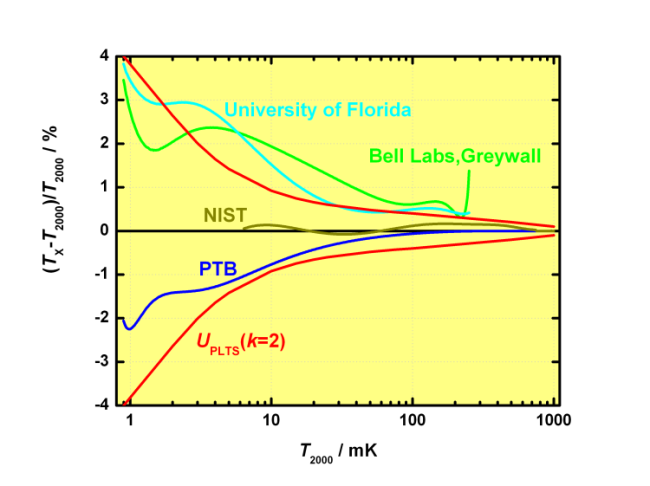WP 4: Primary thermometry for low temperatures
Participants: PTB, CNAM, LNE, MIKES, Stage 2 REG - RHUL, Stage 3 REG - Aalto University
The objectives of this work package are to:
- Build and test several novel designs of primary thermometers for the direct realisation of the kelvin:
- To simplify the dissemination of the kelvin and
- for practical thermometry at temperatures below 1 K
- Resolve the long-standing discrepancy between the background data of the Provisional Low Temperature Scale 2000 (PLTS-2000) through low uncertainty primary thermometry.
The target relative uncertainty for the temperature measurement is ≤1% (this is significantly lower than the current discrepancy in the background data of the PLTS-2000 at 1 mK).
The workpackage is organised as follows. In task 4.1 low-noise dc-SQUIDs that are the central component of noise thermometers will be designed and built. In task 4.2 new current sensing noise thermometers (CSNT), magnetic field fluctuation thermometers (MFFT) and Coulomb blockade thermometers (CBT) will be developed for primary and practical thermometry. In task 4.3 all these thermometers will be used to measure T - T2000, were T is thermodynamic temperature and T2000 is the temperature according to the PLTS-2000. The experimental results of tasks 4.3 and 4.4 combined together will describe the relation between PLTS-2000 and thermodynamic temperature below 1 K.

The background data to PLTS-2000 (TX = T). The discrepancy in the different data sets at the lower temperatures grows rapidly to 6% at ~0.0001 K leading to a large uncertainty increase in the PLTS-2000.
For more information: Contact Jost Engert (PTB)
